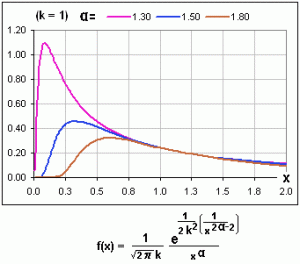Congress has Agoraphobia
The Greek word for marketplace is “agora,” so the word “agoraphobia” literally means “fear of the marketplace,” and Congress seems to be suffering terribly from it lately. Given what has happened over the last couple of years their reaction is unsurprising.
 Indexing, long touted as the safe long-term option for the passive investor, has shown itself to be riskier than we all imagined, producing a negative 10-year return. If stocks always beat bonds over the long term, claim the authors of Dow 36000, then they are in fact less risky than stocks and thus the Dow deserves to be at 36000. If, however, they are more risky, then the index fund industry has some explaining to do.
Indexing, long touted as the safe long-term option for the passive investor, has shown itself to be riskier than we all imagined, producing a negative 10-year return. If stocks always beat bonds over the long term, claim the authors of Dow 36000, then they are in fact less risky than stocks and thus the Dow deserves to be at 36000. If, however, they are more risky, then the index fund industry has some explaining to do.
Of course, after the dot-com collapse, the Nasdaq fell from 80% from top to bottom amid much less wailing, but I get the impression that there was a better sense of the speculativeness of those ventures, whereas the recklessness of financial institutions came as much more of a surprise. As Keynes wrote, “A speculator takes risk of which he is aware; an investor takes risks of which he is unaware.”
However, the response strikes me as excessive in some areas. Even though the the decision by the Fed to guarantee all commercial paper after the fall of Lehman Brothers was a stroke of genius (took in plenty of guaranty premiums without a single payout, not to mention saving the economy and I say that without exaggeration), we have to weigh that against Chairman Cox’s decision to outlaw short selling of financial stocks, which was a knee-jerk reaction that demonstrated a fundamental lack of comprehension of market dynamics that one would not expect from the head of the SEC. In fact, in terms of ignorance it ranks alongside Alan Greenspan finding his “flaw.” Short sellers are a source of liquidity, and illiquidity in the face of panic selling produces a price collapse. Furthermore, shorts taking profits, which they certainly had in plenty last year, are a source of buying pressure that would mitigate the price collapse.
And what, may we ask, is so wrong with a price collapse? If the price drops and sets off a chain reaction of panic selling and margin calls, this will only push the price below even the most pessimistic fundamental estimates, at which point the sensible fructivores will start buying. It is the basis of all value investing, and we actually look forward to it. What distinguishes the commercial paper workout from the ban on short selling is that in the commercial paper arena what we were facing was a complete loss of confidence in the entire market, whereas the short selling ban was nothing more than an artless attempt to prop up prices. As an aside, I read somewhere that a CEO who blames shorts for the low share price of his company tends to give up on average 2% a month in share prices for the next year, and if the CEO blames a conspiracy of shorts, 4% a month.
So, apart from the fact that it’s the Baby Boomers’ retirement, what harm is there in coming to a sudden realization that the markets are riskier than we (most of us, anyway) all thought? Yes, too big to fail institutions are a problem and ideally should be broken up, or better still, forced to pay through the nose into an emergency liquidity fund to clean up the mess when they do fail. Beyond that, though, I don’t see what is the use of having measures designed to reduce volatility or the apparent riskiness of the market–and much of the effects of these measures will stop at appearance only. Optimizing capital structures using leverage does, it must be admitted, increase risk, but it also increases the amount of available capital in the economy, which is good for the GDP, and any mistakes normally work themselves out in bankruptcy court.
 It is disturbing, though, that the regulators still embrace value at risk, which assesses the risk of loss on a financial asset by applying a stochastic process based on volatility that has been observed over a certain period, typically less than five years. Of course, the five years before 2008 were extremely boring in terms of volatility. Value at risk could perhaps be preserved if the period surrounding the collapse of Lehman Brothers was used as representative, but it would be quicker to abandon the stochastic myth, since security prices stop behaving as though they follow a stochastic process just about when panic strikes and every market participant wants them to be stochastic. In a book I read called Lecturing Birds on Flying, Pablo Triana suggests a Levy distribution, whereby events that are 6 standard deviations away from the norm may be predicted to occur every couple of decades instead of every couple of eons. I’ve never been that swayed by quantitative analysis, but if regulators are going to use a quantitative method they could at least use one that hasn’t been demonstrated not to work.
It is disturbing, though, that the regulators still embrace value at risk, which assesses the risk of loss on a financial asset by applying a stochastic process based on volatility that has been observed over a certain period, typically less than five years. Of course, the five years before 2008 were extremely boring in terms of volatility. Value at risk could perhaps be preserved if the period surrounding the collapse of Lehman Brothers was used as representative, but it would be quicker to abandon the stochastic myth, since security prices stop behaving as though they follow a stochastic process just about when panic strikes and every market participant wants them to be stochastic. In a book I read called Lecturing Birds on Flying, Pablo Triana suggests a Levy distribution, whereby events that are 6 standard deviations away from the norm may be predicted to occur every couple of decades instead of every couple of eons. I’ve never been that swayed by quantitative analysis, but if regulators are going to use a quantitative method they could at least use one that hasn’t been demonstrated not to work.
I suppose it is the embracing of the Capital Asset Pricing Model’s conflation of volatility and risk that informs much of the love of quantitative analysis. Volatility is neutral; by chance alone it can put prices in the wrong place, but exploitably and allowing for the likelihood of reversion. Risk is not neutral; it is negative and its effects tend to be more or less irrevocable, unexploitable for most people, and, of course, largely invisible. As an analogy for illustration, suppose that in a hand of Texas Hold’em, I have flopped a straight against my opponent who has flopped a set. There is about a 1/3 chance that he will improve to a full house or better. That is volatility. There is also an unknowable but nonzero chance that he will pull out a gun, rob everyone at the table, and vanish into the night. That is risk. But because it is hard to separate their effects during a the chilling moments of financial panic, Congress and the regulatory bodies feel bound to do something.
The latest proposal from the Senate Finance Committee is a plan to reorganize regulators, create provisions to split up banks that are too big to fail, and create a clearinghouse for derivatives. I agree that too big to fail should mean too big to exist, and as for the regulators, in my view whoever does the regulation is less important as long as they have teeth and the regulations are effective. However, I worry that stripping the Federal Reserve of its power over banks is just anti-Fed hysteria. My issue, however, is with the derivatives clearinghouse. The problem is that so many fancy derivatives these days are over the counter, which allows their terms to be customized. To trade via a clearinghouse, they would have to be standardized and commoditized, which might make them less useful. Furthermore, as happened with equity options and mortgage securities, these arcane instruments would be “domesticated,” and thus acquire an aura of safety and familiarity that is inconsistent with how bad of a mess they can make. Thus Congress, in an attempt to limit their impact by instituting these controls, may wind up causing them to expand, thus exacerbating the problem they intended to solve.
Leave a Reply